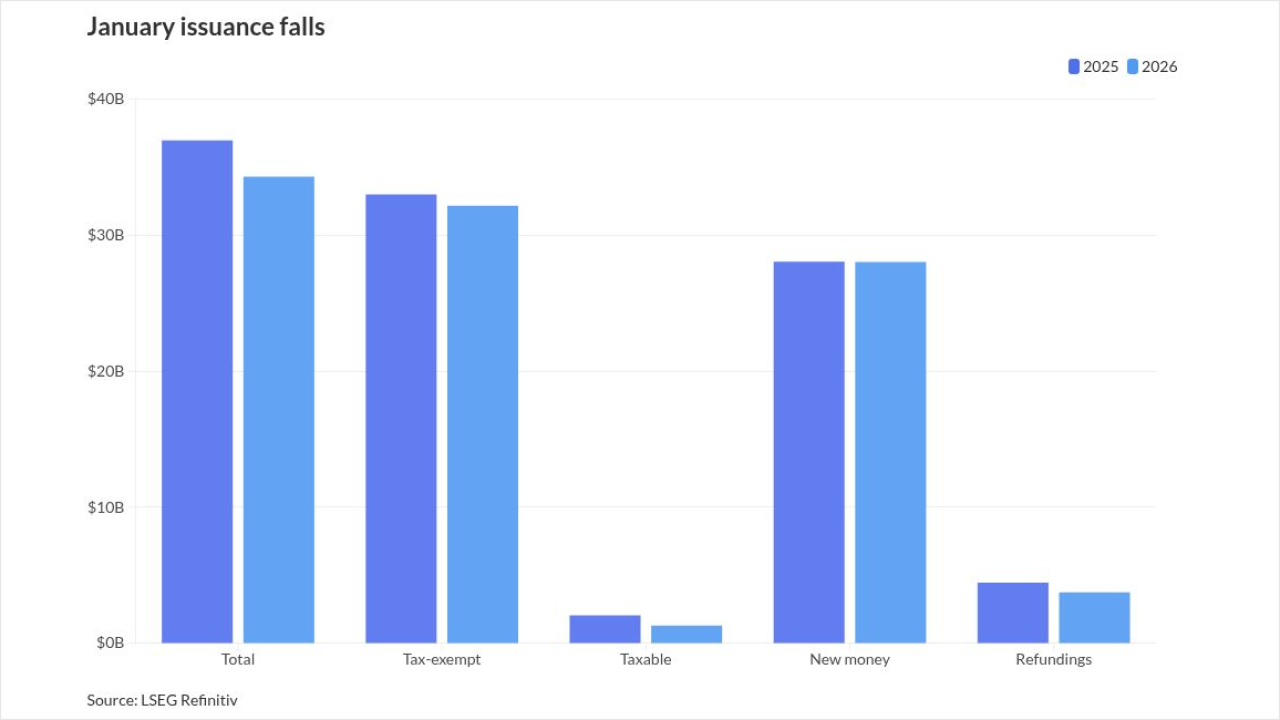CHICAGO — While the Illinois General Assembly’s move to bolster income taxes dominated headlines last week, lawmakers also jacked up the bonding capacity by $5 billion for capital projects and followed California’s lead by requiring underwriters to disclose their credit-default swap positions on state debt.
Illinois intends to tap the increased borrowing authority in a roughly $1.5 billion issue in late spring and another $2.5 billion in fiscal 2012, which begins July 1, state debt manager John Sinsheimer said Tuesday.
Lawmakers approved increases in both the state’s general obligation cap and its sales-tax-backed Build Illinois borrowing program.
“We will continue to issue debt against the revenues in our capital project fund,” Sinsheimer said.
While it is the state’s full faith and credit pledge or sales tax that backs its bonds, some of the new revenues that flow into the capital project fund to help support the $31 billion capital budget have been slow to materialize or are the subject of litigation.
Illinois passed an increase in the vehicle-title and license-plate fees, a new tax on sweet tea, candy, coffee and hygiene products, and an increase in the tax on wine and spirits to repay debt.
Borrowing is also supported by an expansion of gaming with the installation of video gaming terminals at some establishments, and funds from the state’s road fund.
A complaint filed over the summer contends that the package is built on illegal funding mechanisms, including an expansion of gaming that allegedly violates federal law and a liquor-tax hike that is higher on spirits than beer. Meanwhile, some local governments are opting against allowing their establishments to install such gaming terminals.
As Gov. Pat Quinn lobbied lawmakers to support a partial and temporary tax increase to stabilize state finances, several legislative aides said it was the promise of additional capital funding for local projects that helped ease the vote to hike income taxes by two-thirds.
Illinois has had the highest CDS rate among states. It has ranged in recent months from just under 300 basis points to more than 340 basis points.
Under the legislation that has been signed by Quinn, underwriters must disclose their cumulative notional volume of the state’s CDS positions and trades and their outstanding gross and net notional amount of Illinois CDS over the last three months.
Firms must disclose whether their “net position is short or long.” They must also disclose whether they have released any publicly available research or marketing reports that reference state CDS and submit the reports.
Sinsheimer said he has requested that all broker-dealers who are currently among the state’s qualified pool of underwriters submit a report complying with the law by Friday.
Although the provisions originated at the legislative level, the state debt manager said he supports the disclosure requirements.
“I have been concerned over the CDS market and the noise it creates,” he said.
The capital borrowing will follow the state’s planned sale on Feb. 17 of up to $4.1 billion of general obligation bonds to cover its fiscal 2011 pension-fund payments.
The final size is still under review, Sinsheimer said.
The state has selected Goldman, Sachs & Co., Loop Capital Markets LLC, and Morgan Stanley to serve as co-book-running senior managers. Mesirow Financial Inc. and William Blair & Co. are co-senior managers. Peralta Garcia Solutions is serving as adviser.
The legislation calls for the sale of eight-year general obligation bonds with no principal payments in the first two years.
The state would retire $100 million in the third year, $300 million in the fourth year, $600 million in the fifth year, and $900 million of GOs in the remaining years.
Illinois sold $3.5 billion of five-year GO notes to cover much of its fiscal 2010 pension payment. The state has unfunded pension liabilities of $62.4 billion. The fiscal 2011 budget did not include funding for pension payments, forcing some of the funds to sell off assets to meet obligations.
While the state income-tax hike passed with only Democratic votes, both the pension bonding and increased GO and Build Illinois debt capacity received some Republican support. Democrats hold majorities in the state Senate and House. A three-fifths super majority is needed for debt sales.
While the state has paid a premium to access the municipal market over the last year, officials are hoping that lawmakers’ newfound willingness to raise a recurring source of revenue to help address a $15 billion deficit will ease some of the penalty.
Sinsheimer met last week with the big three rating agencies and the state is awaiting their comments.
Illinois sold $7.8 billion of debt in 10 issues last year to fund its pensions, capital projects, and to restructure debt, according to Thomson Reuters. A separate authority sold $1.5 billion of tobacco bonds to help plug a budget hole.
Moody’s Investors Service rates Illinois’ $25 billion of general obligation bonds A1 and Fitch Ratings rates them A, both with negative outlooks. Standard & Poor’s rates the state A-plus, but has it on negative CreditWatch. The outlooks are more long term while CreditWatch reflects a near-term view.
In other action during the lame-duck veto session that took place last week ahead of the swearing-in of a new General Assembly, lawmakers approved and Quinn signed pension reforms opposed by Chicago.
Mayor Richard Daley has warned the changes would drive up property taxes by $550 million.
Chicago’s opposition stems from provisions in the legislation that require it to shift to an actuarially based funding formula by 2015 and reach a 90% funded ratio for its police and firefighters funds in 25 years.
The city’s annual payments are currently based on a formula tied to a percentage of salaries and it falls far short of the actuarially based required contribution to move toward a funded ratio of 90%.
The city intends to still push for legislation that would reduce the mandated funded ratio, extend the time to reach the ratio, and call for increased employee contributions.
At the close of 2009, the city’s firefighters fund was 30% funded and the police fund was at 37%, according to a May 2010 report issued by a pension commission appointed by Daley.
State lawmakers did not vote on a proposed expansion of gaming and rejected the $3.5 billion Taylorville coal-to-gas fired plant.





